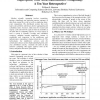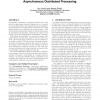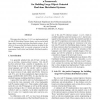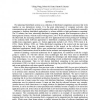131
click to vote
HPDC
1998
IEEE
15 years 6 months ago
1998
IEEE
Modern scientific computing involves organizing, moving, visualizing, and analyzing massive amounts of data from around the world, as well as employing largescale computation. The...
159
click to vote
HPCN
1999
Springer
15 years 6 months ago
1999
Springer
Modern scientific computing involves organizing, moving, visualizing, and analyzing massive amounts of data from around the world, as well as employing large-scale computation. The...
SRDS
1999
IEEE
15 years 6 months ago
1999
IEEE
Validating distributed systems is particularly difficult, since failures may occur due to a correlated occurrence of faults in different parts of the system. This paper describes ...
112
click to vote
HPDC
1999
IEEE
15 years 6 months ago
1999
IEEE
Efficient and robust metacomputing requires the decomposition of complex jobs into tasks that must be scheduled on distributed processing nodes. There are various ways of creating...
101
click to vote
REST
2010
ACM
15 years 6 months ago
2010
ACM
Traditionally, distributed computing problems have been solved by partitioning data into chunks able to be handled by commodity hardware. Such partitioning is not possible in case...
123
Voted
POPL
2000
ACM
15 years 6 months ago
2000
ACM
Adopting a programming-language perspective, we study the problem of implementing authentication in a distributed system. We define a process calculus with constructs for authent...
102
Voted
SRDS
2000
IEEE
15 years 6 months ago
2000
IEEE
Validation of distributed systems using fault injection is difficult because of their inherent complexity, lack of a global clock, and lack of an easily accessible notion of a gl...
125
click to vote
ISORC
2000
IEEE
15 years 6 months ago
2000
IEEE
This paper describes how GLADE, our implementation of the Ada 95 Distributed Systems Annex, can be used to build large object-oriented real-time distributed systems. In addition t...
146
Voted
ICEIS
2000
IEEE
15 years 6 months ago
2000
IEEE
We understand distributed systems as a collection of distributed computation resources that work together as one harmonious system. It is the great achievement of computer network...
ICDCS
2000
IEEE
15 years 6 months ago
2000
IEEE
Replication is an area of interest to both distributed systems and databases. The solutions developed from these two perspectives are conceptually similar but differ in many aspec...





